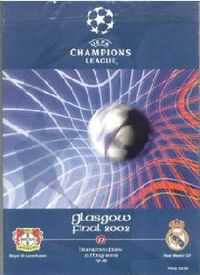The 2002 UEFA Champions League Final was the final match of the 2001–02 UEFA Champions League, Europe's primary club football competition. The show-piece event was contested between Bayer Leverkusen of Germany and Real Madrid of Spain at Hampden Park in Glasgow,[1] on Wednesday, 15 May 2002, to decide the winner of the Champions League. Leverkusen appeared in the final for the first time, whereas Real Madrid appeared in their 12th final.
Each club needed to progress through the group stages, second group stages, and the knockout rounds to reach the final. Bayer Leverkusen finished second in their group behind Barcelona and progressed to the second group stage. There, they won their group, beating the likes of Liverpool and Manchester United to progress to the final. Real Madrid won their group stage and moved into the second group stage, which they also won, before facing Bayern Munich and Barcelona in the knockout stages.
Before the match, a minute of silence was held in honour of Ukrainian manager Valeriy Lobanovskyi, who died two days earlier.[5]
Real Madrid were regarded as favorites before the match and took the lead in the eighth minute through Raúl. However, it took only five minutes before Lúcio could equalise to make it 1–1. This wasn't until the 45th minute, when Zinedine Zidane scored the winning goal, a left-footed volley into the top corner, assisted by Roberto Carlos to make it 2–1, winning the Champions League trophy for Real Madrid.
Route to the final
Bayer Leverkusen entered the competition in the third qualifying round after finishing fourth in the 2000–01 Fußball-Bundesliga. They faced Serbian side Red Star Belgrade, and drew 0–0 in the first leg at The Red Star Stadium.[6] At BayArena, Leverkusen won the second leg 3–0 after two goals from Oliver Neuville and one goal from Ulf Kirsten,[7] and progressed to the group stage by virtue of winning the tie 3–0 on aggregate. Real Madrid entered the competition in the group stage after winning La Liga.
Match
Summary
The match pitted Leverkusen, who had beaten Manchester United in the semi-finals to deny Sir Alex Ferguson a homecoming to Glasgow,[15] against Real Madrid. Real Madrid won 2–1, clinching their ninth European Cup title, and their third in five years.[3] However, the match is remembered as a very close one. Real Madrid's Spanish forward Raúl opened the scoring in the eighth minute, but, five minutes later, Brazilian defender Lúcio levelled the scores with a header that beat goalkeeper César Sánchez. But in the 45th minute, one of the greatest goals in UEFA Champions League history was scored; Zinedine Zidane received a high, arcing cross from Roberto Carlos on the edge of the penalty area, volleying a left-footed shot into the top corner. In the 68th minute, César was injured and had to be replaced by 21-year-old Iker Casillas. With the young Casillas between the posts, Real Madrid managed to hold their ground against a very attacking Leverkusen side, until the final whistle from referee Urs Meier.
Details
Statistics
First half[18]
| Statistic |
Bayer Leverkusen |
Real Madrid |
| Goals scored | 1 | 2 |
| Total shots | 5 | 6 |
| Shots on target | 3 | 3 |
| Ball possession | 42% | 58% |
| Corner kicks | 3 | 1 |
| Fouls committed | 8 | 19 |
| Offsides | 3 | 2 |
| Yellow cards | 0 | 1 |
| Red cards | 0 | 0 |
Second half[16]
| Statistic |
Bayer Leverkusen |
Real Madrid |
| Goals scored | 0 | 0 |
| Total shots | 8 | 6 |
| Shots on target | 3 | 4 |
| Ball possession | 54% | 46% |
| Corner kicks | 3 | 4 |
| Fouls committed | 9 | 25 |
| Offsides | 0 | 1 |
| Yellow cards | 0 | 1 |
| Red cards | 0 | 0 |
|
Overall[16]
| Statistic |
Bayer Leverkusen |
Real Madrid |
|---|
| Goals scored | 1 | 2 |
| Total shots | 13 | 12 |
| Shots on target | 6 | 9 |
| Ball possession | 48% | 52% |
| Corner kicks | 6 | 5 |
| Fouls committed | 17 | 44 |
| Offsides | 3 | 3 |
| Yellow cards | 0 | 2 |
| Red cards | 0 | 0 |
Post match
After the match, Leverkusen manager Klaus Toppmöller expressed his disappointment, stating: "the disappointment is huge – you don't always get the rewards you deserve in football, and no-one knows that better than us after what we have been through. "We must seek consolation. Doing what we have done means we have had a very good season – but what has happened to us is difficult and makes us feel bitter."[19]
See also
References
External links
|
|---|
| European Cup era, 1955–1992 | | | Seasons | |
|---|
| | Finals | |
|---|
| | Champions League era, 1992–present | | | Seasons | |
|---|
| | Finals | |
|---|
| | |
|
|
|---|
| | | | Domestic leagues | |
|---|
| | Domestic cups | |
|---|
| | League cups | |
|---|
| | UEFA competitions | |
|---|
|

